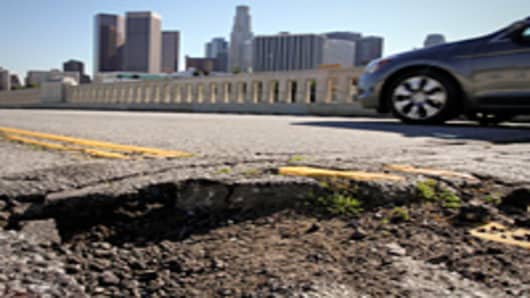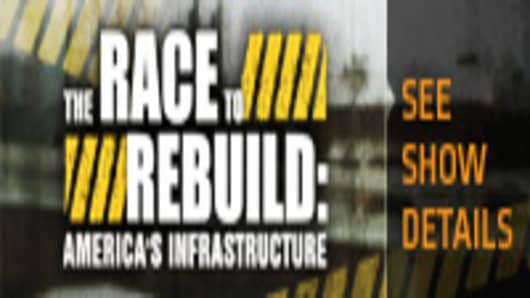America is in the midst of physical decline. Decades of infrastructure neglect are eroding centuries of economic progress.
Call it: The Great Regression.
We the people came of age as our ancestors bumped westward down the National Road. The Erie Canal fed our hungry forefathers by making precious commodities from the Midwestern breadbasket affordable. The Transcontinental Railroad realized bicoastal resources. Starving brothers and sisters on the farm during the Great Depression found salvation along Route 66 while en route to the Land of Milk & Honey. Finally, the nation modernized down the superhighway called the Dwight D. Eisenhower National System of Interstate and Defense Highways. A half-century later, we’re lost without a plan forward, without a vision – without a visionary.
The United States is rich because of its infrastructure. It’s not as if the country decided to go on an infrastructural spending spree once it became wealthy. We built ourselves up one turnpike, one waterworks and one rail line at a time. As our physical improvements begot physical improvements, the nation prospered. As the nation’s coffers filled, so too did those of our forbearers.
“A rising tide lifts all boats,” prophesied President John F. Kennedy while delivering a speech in Colorado. The 1963 Presidential groundbreaking of a water diversion project included: five dams, eight mountain tunnels, and a series of power plants. That infrastructure spawned growth that provided unprecedented prosperity for the Centennial State. Infrastructure matters.
We’re the world’s greatest testament to the democratic process. When it comes to nation building, that’s good and bad. The US is going to do what we do best: exhaust every possible solution before setting upon a corrective course. We’ll resolve this crisis as we have each one before it.
But, the big questions remain unanswered: How to do it? What’s the cost going to be? How long will it take to end the demise? In the meantime, the country regresses as other nations progress. If in doubt, ask The Commander-in-Chief, “We used to have the best stuff: best roads, best airports, best seaports…We’re slipping behind, “said President Obama during his recent “jobs” speech.



